Sarfraz Bugti, chief minister of Balochistan province in southwestern Pakistan, said today that 11 people appearing in a video depicting the double murder in the province's desert have been arrested. According to officials, the victims, Bano Bibi and Ehsan Ullah, were killed on the orders of a tribal council after eloping and marrying against their families' wishes.
The video, posted on social media last week, shows more than 10 men gathered in a desert area, with SUVs and pickup trucks nearby.
Bano is seen facing away from the group when a man in a yellow shirt draws a gun and shoots her in the back. She remains standing after two shots at close range, then falls after a third. The man in yellow then turns his gun on Ehsan, fatally shooting him. The group then fires more shots at both bodies.
 |
The gunman in the double murder in Balochistan province, Pakistan, last week. Photo: Express Tribune |
The gunman in the double murder in Balochistan province, Pakistan, last week. Photo: Express Tribune
Bugti described the act as "barbaric". A local police official reported that the woman did not beg for her life. "You are only allowed to shoot me. Nothing else," she said. The meaning of her phrase "nothing else" remains unclear.
According to police, Bano’s cousin and the head of the tribal council are among those arrested.
Tribal councils, composed of elder men, are common in rural Pakistan and traditionally resolve local disputes. These councils exist legally alongside the modern court system.
Much of Pakistani society places a high value on "honor". Women's education, employment, and marriage choices are often dictated by male family members. Hundreds of women are killed by men in Pakistan each year in the name of honor. In 2024, Pakistan saw at least 405 honor killings.
Women’s rights activist Nighat Dad said that tribal councils continue to rule on such cases, despite a ban from the Supreme Court of Pakistan. "This killing might have been buried like hundreds of others if the video had not been posted on social media," she said.
Huyen Le (AFP, Reuters)












